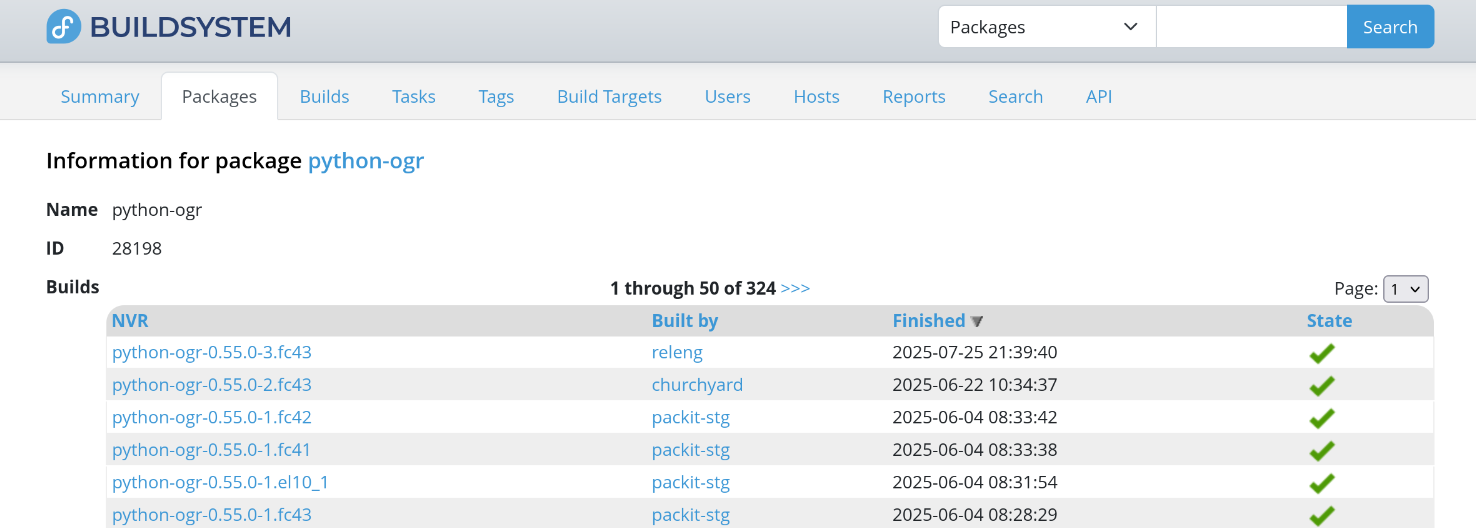job: koji_build

Trigger the build in
Fedora Koji build system
as a reaction to a new dist-git commit.
A Packit config file needs to be in the dist-git repository
to allow this job to be triggered.
Packit loads the config from the default dist-git branch (usually rawhide). Packit configs on other branches are ignored.
The build is triggered only for commits with a spec-file change.
By default, only merged pull requests created by Packit are being acted upon so the proven packager
workflow is
preserved, details
here. You can override this behaviour by specifying
allowed_pr_authors and/or allowed_committers in the job configuration (see below). For direct pushes, the committer needs to
be specified in the allowed_committers and for merged pull requests the author of the PR needs to be
specified in the allowed_pr_authors.
Due to a bug, if you merge a PR containing more than one commit or push more than one commit directly, the job may not be triggered even though all conditions are met. In such case please trigger it manually.
Packit provides an overview of its own builds here.
The koji build behaves as it was created manually, and you can utilise
Fedora Notifications
to be informed about the builds. Also, you can configure a repository where should we
open issues in case of errors during the job via issue_repository configuration key.
For Koji builds from upstream, see upstream_koji_build.
You can use our downstream configuration template for creating your Packit configuration in dist-git repository.
You can also use packit dist-git init CLI command to create your Packit dist-git configuration.
Supported triggers
- commit - reacts to new commits to the specified branch (in dist-git)
- koji_build - reacts to tagging of a Koji build into the configured sidetag group More info about releasing multiple packages together using sidetags can be found here.
- job: koji_build
trigger: commit | koji_build
Required parameters
- dist_git_branches - the name of the dist-git branch we want to build for. You can also use the aliases provided by Packit to not need to change the config file when the new system version is released.
Optional parameters
- scratch - defaults to
false, use to create scratch (test) builds instead of the real production builds - allowed_pr_authors - a list of PR authors whose merged pull requests will trigger Koji builds
(defaults to
['packit']). As each item of the list you can specify:- name of a FAS account, e.g.
my-fas - name of a group - starting with
@, e.g.@my-sig(don't forget to put the group name in quotes - a token in YAML is not allowed to start with@) all_adminsalias - allowing all users with admin access to the dist-git repoall_committersalias - allowing all users with commit access to the dist-git repo
- name of a FAS account, e.g.
- allowed_committers - a list of committers whose direct pushes to dist-git will trigger Koji builds
(defaults to an empty list). It is enough to configure the
allowed_pr_authorsoption if you want to have Koji builds triggered only by merged pull requests. Similarly to the previous option, as each item of the list you can specify:- name of a FAS account, e.g.
my-fas - name of a group - starting with
@, e.g.@my-sig(don't forget to put the group name in quotes - a token in YAML is not allowed to start with@) all_adminsalias - allowing all users with admin access to the dist-git repoall_committersalias - allowing all users with commit access to the dist-git repo
- name of a FAS account, e.g.
- sidetag_group - name of a sidetag group this Koji build should be tagged into.
The name has to be unique across all projects that use Packit, so don't hesitate to be descriptive.
A good convention is to use
${package1}-${package2}...${packageN}-updates. If specified, after a build finishes it is tagged into a sidetag (that is created if it doesn't already exist) corresponding to the dist-git branch of the build. - dependencies - list of downstream package names that are required to be tagged
into the configured sidetag group for this job to be triggered. For example, if you want to ensure
that a
koji_buildjob with the same sidetag group configured in packagefoois run first, you need to listfoohere. - dependents - list of downstream package names that should react to tagging of this build
into the configured sidetag group. For example, if a
koji_buildjob with the same sidetag group configured in packagebaris supposed to be triggered after this build finishes, you need to listbarhere. - require.label - you can specify labels that have to be present/absent on a pull request in order to trigger the build when it is merged. See configuration details here.
Retriggering
For retriggering the job, see retriggering docs.
Processing of dist-git events from Pagure
Because of the potential issues with rendering:
- dotted lines represent no
- continous lines represent yes
Example
issue_repository: https://github.com/my-username/packit-notifications
jobs:
- job: koji_build
trigger: commit
allowed_committers: ["jsmith"]
dist_git_branches:
- fedora-all
- epel-8